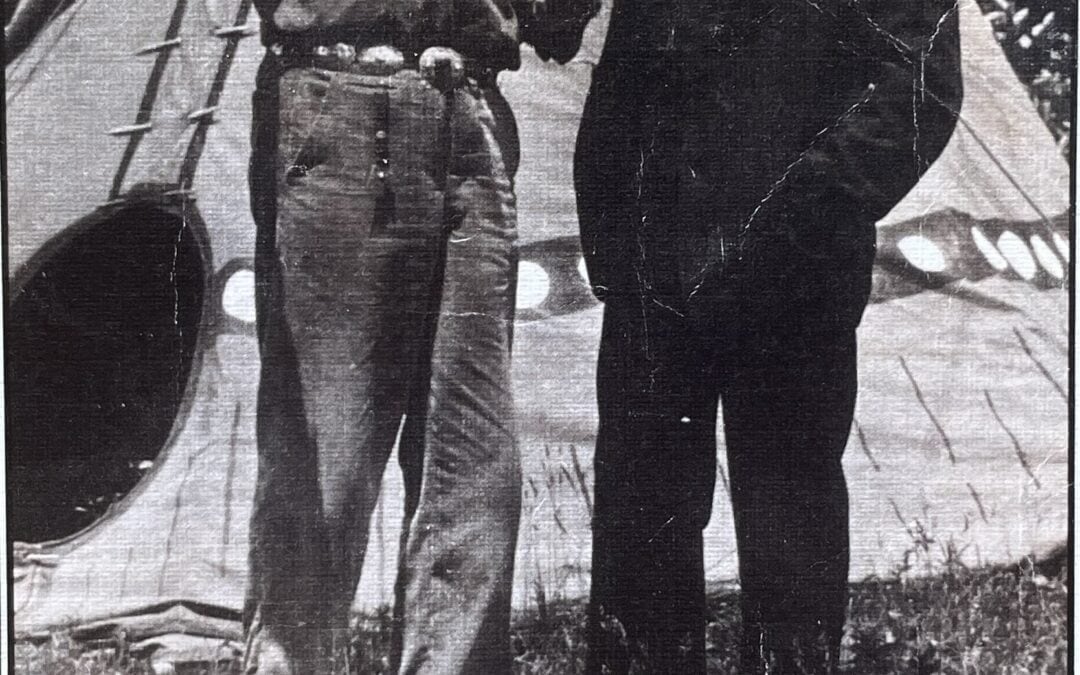The on-line version of britannica.com gives a short (and misleading) answer to the question: Who founded the Boy Scouts? Their short answer is: Robert Baden-Powell (a.k.a. “B-P”). But that asks the wrong question, so let’s rephrase: Who came up with the idea that led to the Boy Scouts and related youth-oriented organizations? Answer: Ernest Thompson Seton.
Whose Line Is It Anyway?
Or: whose lie is it anyway? My reading of Seton—Baden-Powell correspondence, as well as the earliest editions of Seton’s Birchbark Roll compared to Baden-Powell’s Scouting for Boys, clearly shows that the majority of organizational principles came from Seton. The name Boy Scouts, and the subsequent international success of related organizations, came from Baden-Powell. An ethical problem comes from B-P’s failure to acknowledge Seton as the movement’s theorist. While Seton disliked B-P’s injection of militarism, modifying his intended Woodcraft principles, he readily acknowledged the British general’s success at promotion (not to mention, B-P’s self-promotion).
At least one B-P biography I consulted wrote off Seton’s contributions to the Scouting movement in just a few sentences. I can see why the biographer was in a hurry to get past the issue since looking into the documentation proves that Seton, not B-P came up with the idea.
Brian Morris and Seton
While American scholars are coming to the irrefutable conclusion of Seton as the idea-founder, the Brits have lagged behind. An important exception: polymath Brian Morris, Emeritus Professor of Anthropology (Goldsmiths College, University of London). He published his contribution to the debate over Seton vs. B-P origin story.
His book: Ernest Thompson Seton, Founder of the Woodcraft Movement 1860-1946, Apostle of Indian Wisdom and Pioneer Ecologist. (Edwin Mellen Press, 2007)
Dr. Morris covers a lot of Seton ground through his extensive research, but here I will confine myself to his view of B-P. Alert to B-P fans: Morris is not a fan.
Here is an example. Regarding credit for inventing the Scouting idea: “this was Baden-Powell’s greatest con of all. For anyone who examines the historical record, or even looks at Seton’s booklet Birch Bark Roll of the Woodcraft Indians, will come to realize that Baden-Powell appropriated, in a devious fashion and without acknowledgement, all the essential ideas of the artist-naturalist [Seton]. (Pg. 205)
I realize this repeats what I started with, but it is important to acknowledge that other scholars have come to the same conclusion.
Morris continues: “Baden-Powell’s political and moral philosophy can be described as militarist, imperialist and authoritarian—almost fascist.” Which is to say that B-P was in every way Seton’s opposite in terms of his view of the moral life. A public examination of B-P’s racism, including his callus abuse of black Africans, might give even his most ardent defenders pause. Well, probably not.
Ethical Irony
The who-founded-Scouting-dispute created for Seton an impossible quandary which he never resolved. Even to the end of his life, an embittered Seton insisted on taking credit for the formation of the Scouting movement. At the same time, he rejected the (partial) acceptance of the B-P model adopted by the Boy Scouts of America. Seton thus simultaneously claimed and rejected Scouting as his own. No wonder that historians have had a difficult time trying to sort through the legacy mess.
While Seton needed the support of wealthy patrons for his Woodcraft endeavors, he didn’t want their ideological input—unlike the Scouts who welcomed the money and political outlook of conservative Republicans. Morris points out that “Seton never allowed his movement to become an adjunct to any social or political interest.” (Pg. 211) Seton’s Woodcraft League, founded as a Boy Scout alternative in 1915, found neither financial or popular support. Seton stuck to his principles, leading his official Woodcraft organization to oblivion.
Under James West the Boy Scouts of American found a winning formula of balancing the financial support of rich conservatives while limiting the infiltration of their politics. Note that the catastrophic decline in Boy Scouts of America membership coincided with their official embrace of right-wing political ideology in the 1980s. They should have followed Seton’s and West’s example and concentrated on youth education. But that is a story for another time.
The March Of History
Morris concludes (and I agree) that in terms of the historical record Seton and Baden-Powell should be recognized as the founders of the Scouting movement: Seton as original theorist; B-P as organizer and promoter. There is room for both as long as we acknowledge who did what in this important work. (Add Charles Eastman and Dan Beard for their important contributions to American Scouting.)
The Seton Legacy waited a century + for scholars who would be brave enough to tell the truth about B-P and about Seton in the origins of Scouting. Dr. Morris deserves great credit for being one of them.

